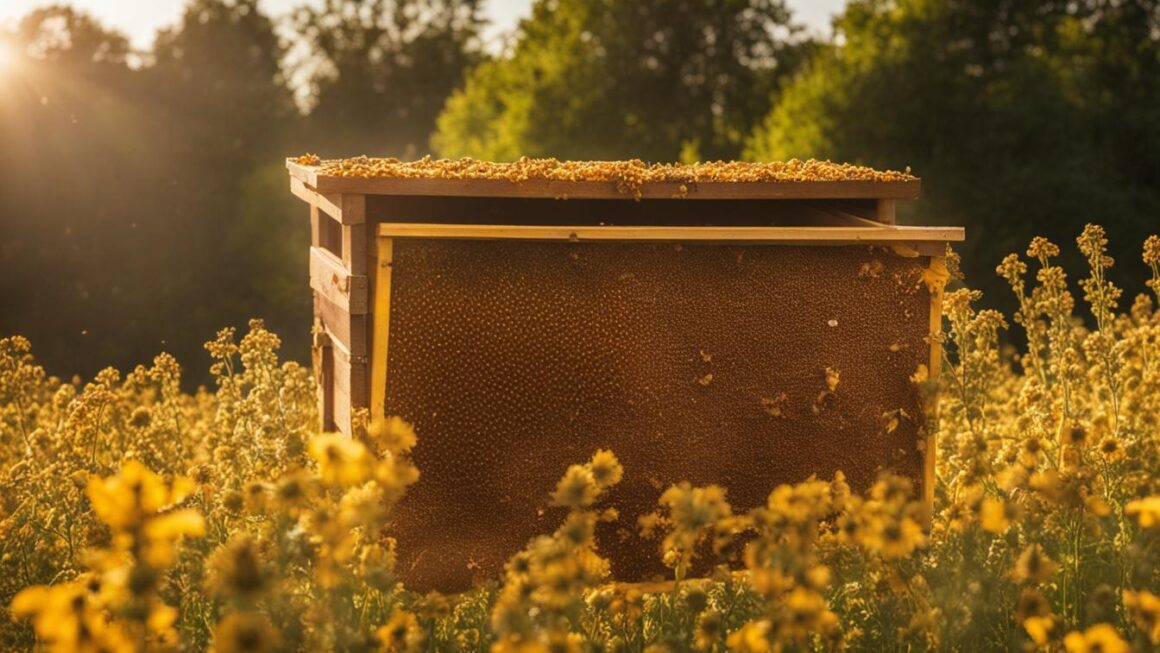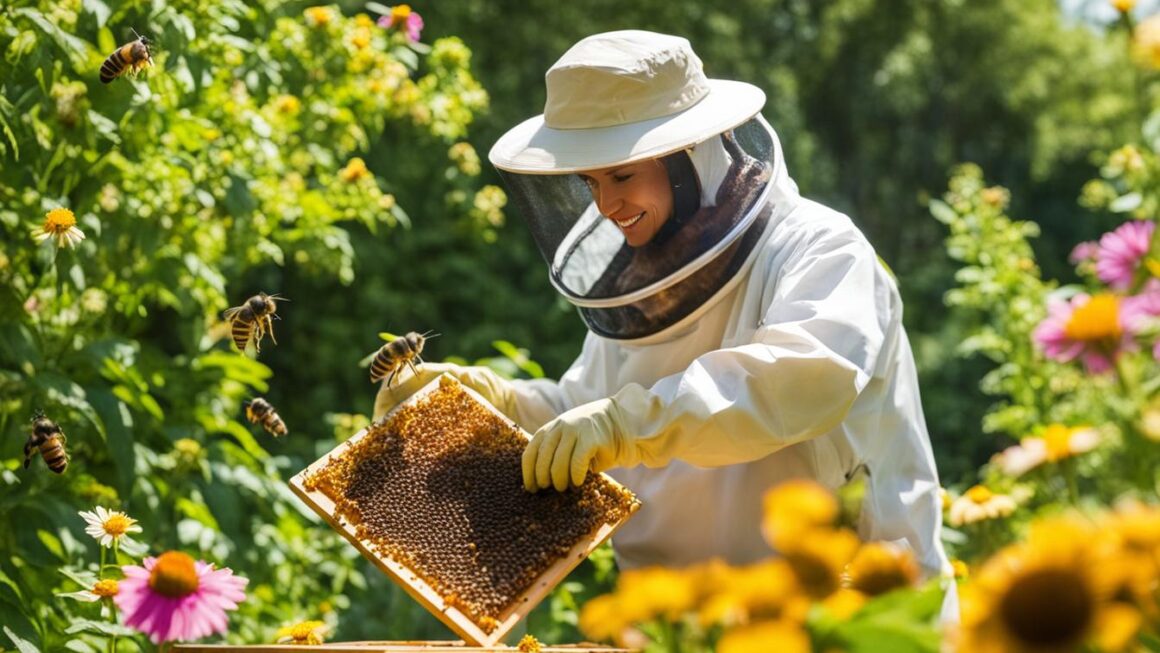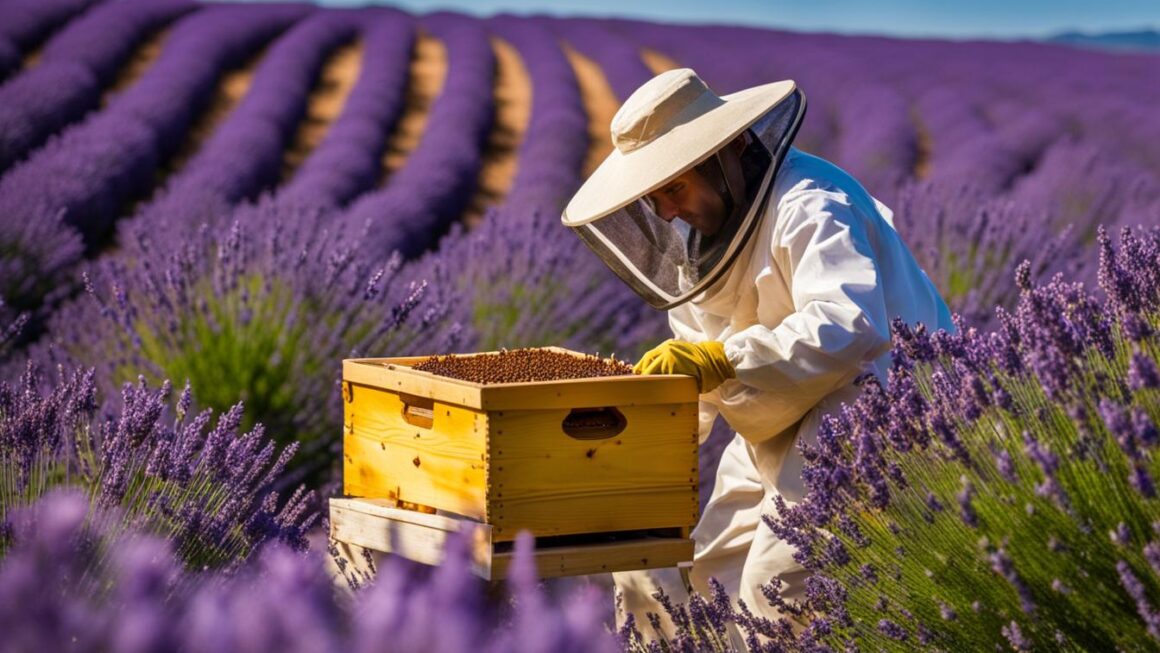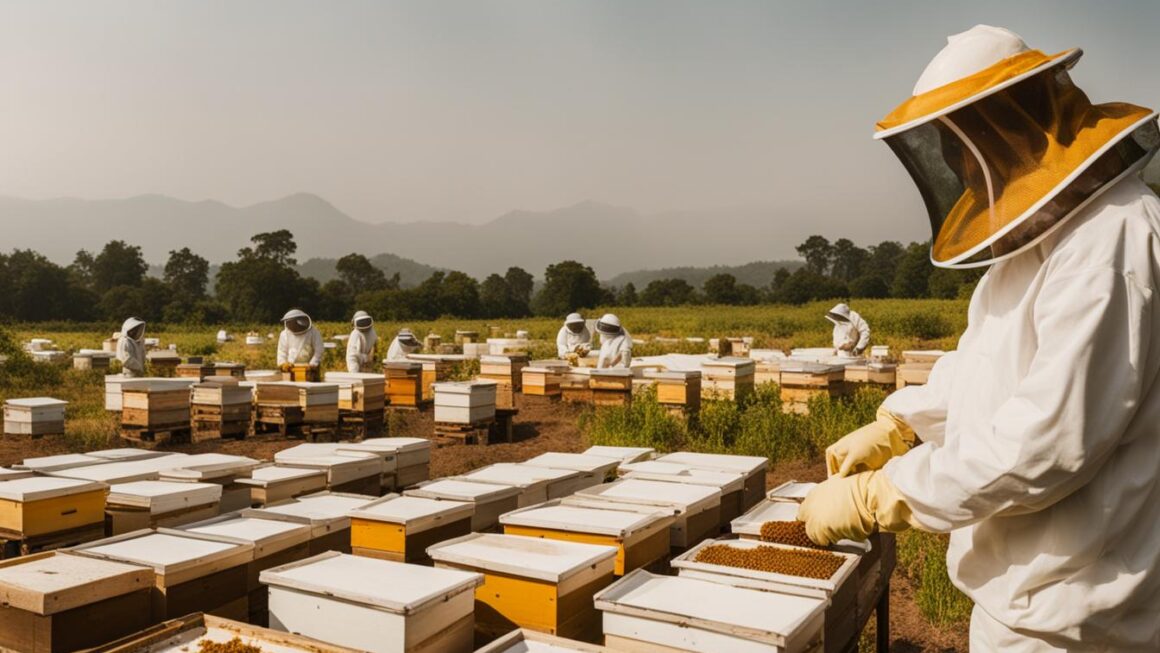Are you looking for pure and natural honey? Discover the fascinating process of organic honey production, where every step is eco-friendly and promotes sustainable practices. Organic honey is not just a product; it embodies a commitment to clean living and environmental protection.
Key Takeaways:
- Organic honey production follows a carefully regulated process that ensures high-quality honey without the use of chemicals or additives.
- Organic beekeepers prioritize natural hive management techniques and avoid the use of synthetic substances.
- The hives for organic honey production are located in rural or wild areas, far from contamination sources.
- Organic honey offers a range of health benefits, including antioxidants and antibacterial properties.
- By choosing organic honey, consumers can support sustainable beekeeping practices and enjoy the unique flavors it offers.
Why Do Bees Make Honey?
Bees are incredible creatures that play a vital role in our ecosystem. One of their most remarkable abilities is the production of honey. But have you ever wondered why bees make honey? Let’s delve into the fascinating world of honey production and uncover the reasons behind this sweet phenomenon.
Bees make honey primarily as a source of food for their colony. When bees collect nectar from flowers, they store it in their honey stomachs. Back at the hive, they regurgitate the nectar and pass it along to other worker bees. These bees then chew the nectar, breaking it down into simple sugars through enzymes in their saliva. The nectar is then deposited into honeycomb cells, where water evaporates due to the flapping of bees’ wings, transforming the nectar into thick, viscous honey.
So why do bees produce more honey than they need for their immediate sustenance? The answer lies in their survival instincts. Bees create a surplus of honey to ensure their colony’s survival during times of scarcity, such as winter or when blooming flowers are scarce. This surplus honey becomes a valuable resource for beekeepers, who can safely harvest the excess honey without compromising the bees’ well-being. It’s estimated that a single hive can produce around 55 pounds of surplus honey per year!
| Reason | Description |
|---|---|
| Source of Food | Bees make honey as a source of food for their colony, especially during times of scarcity. |
| Survival Strategy | By producing more honey than they need, bees ensure their colony’s survival during challenging times. |
| Resource for Beekeepers | Beekeepers can harvest the surplus honey produced by bees, providing a sustainable source of delicious honey. |
The Honey-Making Process
The process of honey production involves a complex interplay between bees and their environment. Bees diligently collect nectar from a variety of flowers, contributing to pollination in the process. Once back at the hive, the nectar undergoes a transformation through enzymatic activity and evaporation, resulting in the creation of honey. This natural process not only provides bees with nourishment but also produces a delicious and versatile substance that humans have enjoyed for centuries.
As beekeepers, we can appreciate and benefit from this amazing process by lovingly tending to our bees and responsibly harvesting the surplus honey they produce. By doing so, we can savor the sweet rewards of their labor while supporting healthy bee populations and sustainable beekeeping practices.
The Organic Honey Production Process
Organic honey is produced through a carefully regulated and environmentally friendly process that prioritizes sustainability and natural hive management techniques. The production of organic honey involves several key steps to ensure its high quality and integrity.
Firstly, the hives are strategically located in rural or wild areas, far from potential sources of contamination such as crop fields, industries, and population centers. This ensures that the honey produced is free from chemical residues and maintains its organic nature.
Secondly, organic beekeepers follow natural hive management techniques, avoiding the use of chemicals to keep the bees healthy. Bees feed only on the honey and pollen they produce, without any additional food or flavor enhancers. Natural treatments or ecological drugs authorized by health agencies are used for pest and disease control, ensuring a chemical-free approach to bee care.
Finally, organic honey is harvested when it is ripe and undergoes minimal processing. The honeycombs are carefully inspected, and the wax caps are removed to access the honey. The honey is then extracted using a gentle centrifugal process that does not alter its natural composition. It is then strained to remove any impurities without the use of heat or pasteurization, preserving its nutrients and natural healing properties. The organic honey is bottled without the addition of artificial sugars or preservatives, ensuring a pure and natural product.
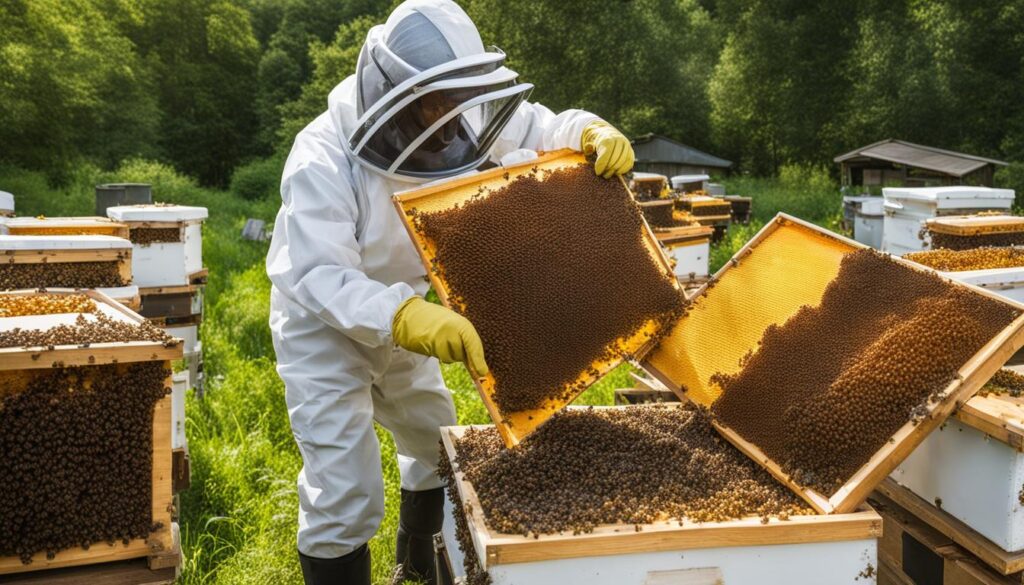
| Benefits of Organic Honey Production Process | Details |
|---|---|
| Environmentally Friendly | The process follows sustainable practices and avoids the use of chemicals, preserving the health of bees and the natural habitat. |
| Natural Hive Management | Organic beekeepers prioritize the health of their bees by implementing natural hive management techniques, ensuring the bees’ well-being. |
| Natural Treatments | Eco-friendly treatments authorized by health agencies are used for pest and disease control, avoiding the use of chemical products. |
| Organic Certification | The production process is certified organic, guaranteeing the highest quality and adhering to strict organic standards. |
The Benefits of Organic Honey
Organic honey offers numerous health benefits, making it a popular choice among consumers. Its natural composition and production process contribute to its superior quality and unique flavor. Here are some of the key benefits of organic honey:
“Organic honey is rich in antioxidants and has antibacterial properties. It is also known for its anti-inflammatory effects.”
Antioxidants: Organic honey contains a high level of antioxidants, which help to slow down cellular breakdown and support a healthy immune system. These antioxidants protect the body from harmful free radicals.
Antibacterial Properties: Organic honey has natural antibacterial properties that can help fight against harmful bacteria. It has been used for centuries as a natural remedy for various ailments.
A Support for Beekeepers: Choosing organic honey supports local beekeepers who adhere to sustainable and eco-friendly practices. By purchasing organic honey, consumers contribute to the preservation of bees and their natural habitats.
Overall, organic honey is a healthy and environmentally conscious choice. Its rich antioxidant content, antibacterial properties, and support for beekeepers make it a valuable addition to a clean and natural lifestyle.
Organic Honey Certification
Organic honey certification is a crucial aspect of ensuring the authenticity and quality of organic honey. It guarantees that the honey is produced in accordance with strict organic farming practices and sustainable production methods. Organic beekeeping prioritizes environmental protection and the use of natural, eco-friendly techniques, making it a preferred choice for those who value clean and sustainable food sources.
By obtaining organic certification, beekeepers commit to maintaining the integrity and purity of their honey production process. They adhere to guidelines that prohibit the use of chemicals, antibiotics, and artificial additives in their beekeeping operations. This ensures that the honey remains free from any harmful residues that could compromise its quality or health benefits.
Organic honey certification also promotes environmental protection. Organic beekeepers prioritize the preservation of natural habitats and biodiversity by locating their hives in areas away from contamination sources. This not only safeguards the health of the bees but also contributes to the overall health of the ecosystem. Additionally, organic beekeeping practices support sustainable agriculture and agroforestry by promoting bees’ pollination activities in certified organic fields.
When purchasing organic honey, consumers can look for the organic certification label to ensure they are making a sustainable and environmentally conscious choice. By supporting organic honey producers, consumers contribute to the preservation of bees and their natural habitats, promoting a healthier and more sustainable food system.
Organic Honey Certification Importance
Organic honey certification is of utmost importance for several reasons:
- Guarantees the authenticity and quality of the honey
- Promotes sustainable and environmentally friendly production practices
- Protects the health of bees and their habitats
- Supports organic farming and agroforestry initiatives
- Ensures the absence of harmful chemicals or additives
With organic honey certification, consumers can trust that they are purchasing a product that not only tastes delicious but also aligns with their values of sustainability and environmental protection.
| Benefits of Organic Honey Certification | Importance |
|---|---|
| Ensures the honey is produced using environmentally friendly practices | Promotes sustainable agriculture |
| Supports the health and well-being of bees | Protects biodiversity |
| Guarantees the absence of chemicals and artificial additives | Ensures a pure and natural product |
Location of the Hives
In organic beekeeping, the selection of hive locations is crucial. Hives are typically placed in rural or wild areas, away from any potential sources of contamination. Protected natural spaces are particularly preferred. European regulations require hives to be at least 3 km away from crop fields, industries, population centers, or any other potential contamination sources. This ensures that the honey produced is free from chemical residues and maintains its organic integrity.
By placing the hives in protected natural spaces, organic beekeepers create an ideal environment for their bees to thrive. These areas are rich in diverse flora, providing a variety of nectar sources for the bees to collect. Moreover, the absence of chemical treatments in these areas ensures that the bees are not exposed to harmful substances that can negatively impact their health and the quality of the honey they produce.
Organic beekeeping prioritizes the preservation of natural habitats and the well-being of the bees. By carefully selecting hive locations away from contamination sources, organic beekeepers contribute to the overall health and sustainability of bee populations.
| Hive Location | Benefits |
|---|---|
| Rural Areas | Minimal exposure to pesticides and pollutants |
| Wild Areas | Abundance of diverse flora for bees to forage |
| Protected Natural Spaces | Preservation of natural habitats and biodiversity |
By ensuring that hives are placed in locations that prioritize the health and well-being of the bees, organic beekeepers are able to produce honey that is free from chemical contaminants and full of natural flavors and nutritional benefits. Consumers can trust that organic honey from these hives is a pure and sustainable choice.
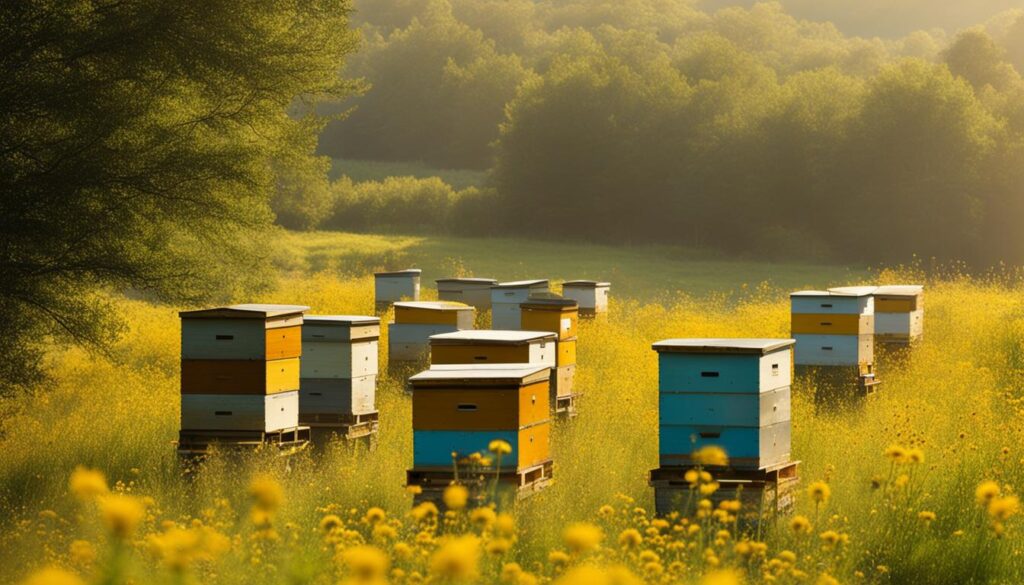
Bee Care in Organic Honey Production
In organic beekeeping, the health and well-being of the bees are of utmost importance. Beekeepers prioritize natural hive management techniques to ensure the bees thrive in a chemical-free environment. Unlike conventional beekeeping, where bees may be fed with artificial sweeteners or enhancers, organic beekeepers allow their bees to feed solely on the honey and pollen they produce. This approach ensures that the bees have a natural and balanced diet, which promotes their overall health and vitality.
Chemical products, such as phytosanitary products and antibiotics, are strictly avoided in organic beekeeping practices. This is done to prevent these substances from contaminating the honey and ultimately reaching the consumers. Instead, natural treatments or ecological drugs that are authorized by health agencies are used for disease prevention and control. These natural treatments provide an effective and chemical-free approach to bee care, safeguarding both the bees and the quality of the honey they produce.
Furthermore, organic beekeepers prioritize the preservation of the bees’ natural habitat and biodiversity. By selecting hive locations in protected natural spaces, away from potential sources of contamination, organic beekeepers ensure that bees can forage on nectar from organic certified fields. This practice contributes to the preservation of the environment and supports sustainable beekeeping practices.
Bee Care in Organic Honey Production: At a Glance
| Aspect | Approach in Organic Beekeeping |
|---|---|
| Hive Management | Natural techniques, no artificial sweeteners or enhancers |
| Chemical Use | Avoidance of phytosanitary products and antibiotics |
| Disease Control | Authorized natural treatments and ecological drugs |
| Habitat Preservation | Selection of hive locations in protected natural spaces |
Organic beekeeping practices prioritize the well-being of the bees and the production of high-quality honey without compromising on environmental sustainability. By choosing organic honey, consumers support beekeepers who prioritize the health of their bees and the preservation of their natural habitat. Organic honey not only offers a delicious and natural alternative but also provides peace of mind knowing that it is produced with care and without the use of harmful chemicals.
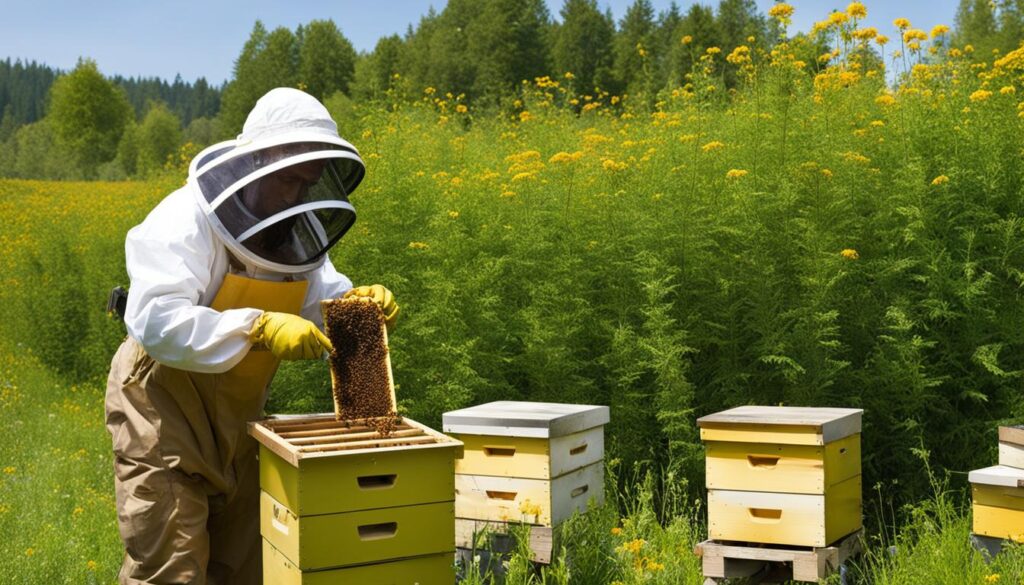
Organic Honey Production Process
Bee behavior plays a crucial role in the organic honey production process. Bees collect nectar from flowers during the blooming season and bring it back to the hive to produce honey. They diligently visit numerous flowers, extracting nectar using their proboscis and storing it in their honey stomachs. Once back at the hive, the bees transfer the nectar to other worker bees through regurgitation. The nectar is then broken down into simple sugars and stored inside the honeycomb cells.
Inside the honeycomb, the nectar undergoes a process known as honey ripening. Bees fan their wings to create airflow that evaporates excess moisture from the nectar, reducing its water content to around 18%. This lower water content is crucial for honey’s long-term preservation.
When the honey is deemed ripe, the bees seal each honeycomb cell with a wax cap created from beeswax. Beekeepers carefully remove these wax caps to access the honey for extraction. Using a centrifuge, the beekeeper spins the frames, causing the honey to separate from the honeycomb. The extracted honey is then filtered to remove any remaining wax particles and impurities. It is important to note that organic honey production does not involve any artificial additives or processing techniques that alter the natural composition of the honey.
To summarize, the organic honey production process involves bee behavior, nectar collection, honey ripening, wax caps removal, honey extraction, and filtering. It is a meticulous process that ensures the production of high-quality, pure, and natural organic honey.
The Origins of Honey and Its Properties
Honey is a natural and nutritious sweetener that originates from flower nectar. Bees collect nectar from various flowers and bring it back to the hive, where it undergoes a fascinating transformation. Through the process of evaporation, facilitated by the bees’ wings, the nectar is converted into the golden liquid we know as honey. The bees store the honey in hexagonal cells called honeycombs, which they create using beeswax.
Honey is not just delicious; it also contains essential minerals, vitamins, and antioxidants. It is a rich source of minerals such as calcium, magnesium, zinc, and iron, which are vital for our overall health. Additionally, honey contains essential vitamins, including vitamin C and B-complex vitamins, which support various bodily functions.
The antioxidant properties of honey are particularly noteworthy. Antioxidants help protect our cells from damage caused by harmful free radicals, which can contribute to chronic diseases and aging. Honey’s antioxidants, such as flavonoids and phenolic compounds, have been linked to numerous health benefits, including reducing inflammation and supporting the immune system.
| Minerals | Vitamins | Antioxidants |
|---|---|---|
| Calcium | Vitamin C | Flavonoids |
| Magnesium | Vitamin B-complex | Phenolic compounds |
| Zinc | ||
| Iron |
With its origins in flower nectar and its abundance of minerals, vitamins, and antioxidants, honey is not only a delicious natural sweetener but also a valuable addition to a healthy diet.
Differences Between Organic and Conventional Honey
When it comes to honey, there are significant differences between organic and conventional varieties. Organic honey is obtained from flowers in certified fields that meet strict organic beekeeping protocols, ensuring a higher quality and more sustainable product. In contrast, conventional honey may come from hives located near chemically treated crops, potentially exposing the bees and honey to harmful substances.
One key distinction is the type of hives used in organic and conventional honey production. Organic beekeepers prioritize wooden hives, which are painted with organic vegetable oils. This choice not only supports environmental protection but also helps maintain the integrity of the honey by avoiding the use of synthetic materials or chemical coatings.
Temperature preservation is another important factor in organic honey production. Honey extraction is carried out at the same temperature as the hive, ensuring that delicate aromas and flavors are preserved. Conventional honey production may involve pasteurization or heat treatment, which can alter the natural composition of the honey and reduce its nutritional value.
“Organic honey is obtained from flowers in certified fields that meet strict organic beekeeping protocols, ensuring a higher quality and more sustainable product.”
To summarize, choosing organic honey means supporting certified fields and environmentally friendly practices. It means opting for honey produced in wooden hives, preserving the delicate flavors and aromas through temperature preservation. By understanding these differences, consumers can make informed choices and enjoy the many benefits of organic honey.
| Organic Honey | Conventional Honey |
|---|---|
| Obtained from certified fields | May come from hives near chemically treated crops |
| Wooden hives, painted with organic vegetable oils | May involve the use of synthetic materials or chemical coatings |
| Extracted at hive temperature | May undergo pasteurization or heat treatment |
| Preserves delicate flavors and aromas | Potential alteration of natural composition |
Conclusion
Organic honey production follows a carefully regulated process that ensures high-quality honey without the use of chemicals or additives. The bees collect nectar from flowers in certified fields located away from sources of contamination. The honey is harvested when ripe, and beekeepers extract it using environmentally friendly methods. Organic honey is then filtered and bottled, preserving its natural composition and nutrients.
By choosing organic honey, consumers not only benefit from its unique flavors and health benefits but also support sustainable beekeeping practices. Organic beekeeping prioritizes the well-being of bees, utilizing natural hive management techniques and avoiding the use of chemical products. This approach not only protects the environment but also contributes to the preservation of bees and their natural habitat.
Furthermore, organic honey production is certified, guaranteeing that it adheres to strict organic farming standards. This certification ensures that the honey is produced sustainably, promoting environmental protection and sustainable agricultural practices. By purchasing organic honey, consumers can make a positive impact by supporting organic beekeepers and enjoying a high-quality product that is free from chemicals and additives.
FAQ
How is organic honey produced?
Organic honey is produced through a careful and environmentally friendly process. Bees collect nectar from flowers, which is then broken down into simple sugars and stored inside the honeycomb. Through evaporation caused by bees’ wings, the nectar transforms into sweet liquid honey. The honey is then harvested, strained to remove impurities, and bottled for sale.
Why do bees make honey?
Bees make honey as a source of food. They collect nectar from flowers, which provides energy for their flight muscles and heating for the hive during winter. Bees produce more honey than their colony needs, creating a surplus that beekeepers can harvest.
What is the organic honey production process?
Organic honey production follows a careful and environmentally friendly process. Organic beekeepers use natural hive management techniques and avoid using chemicals to keep the bees healthy. Bees feed only on the honey and pollen they produce, and natural treatments or ecological drugs authorized by health agencies are used for pest and disease control. Organic honey is harvested when ripe, filtered, and packaged without pasteurization or heat treatment to preserve its nutrients and natural healing properties.
What are the benefits of organic honey?
Organic honey offers a range of health benefits. It is rich in antioxidants, antibacterial properties, and has anti-inflammatory effects. Organic honey supports local beekeepers and contributes to the preservation of bees and their natural habitat. Choosing organic honey means choosing a product that is free from chemicals and additives.
How can I identify organic honey?
Look for the organic certification label to ensure you are purchasing genuine organic honey. The organic certification guarantees that the honey is produced sustainably and adheres to environmentally friendly practices.
Where are the hives located in organic beekeeping?
Hives in organic beekeeping are typically placed in rural or wild areas, far from potential sources of contamination. They must be at least 3 km away from crop fields, industries, population centers, or any other potential contamination sources.
How are bees cared for in organic honey production?
Bees in organic beekeeping systems are cared for using natural hive management techniques. They feed only on the honey and pollen they produce, without any additional food or flavor enhancers. Chemical products, including antibiotics, are strictly avoided. Natural treatments or ecological drugs authorized by health agencies are used for disease prevention and control.
What is the organic honey production process?
Bees collect nectar from flowers during the blooming season and bring it back to the hive to produce honey. In organic honey production, honey is only harvested when it is ripe. Beekeepers remove the wax caps, which bees create to seal off honey in each cell, and extract the honey using a centrifuge. After extraction, the honey is filtered to remove any remaining wax and impurities. It is then bottled without undergoing any pasteurization or heat treatment to preserve its natural composition.
Where does honey come from and what are its properties?
Honey originates from flower nectar that bees collect. Through evaporation caused by bees’ wings and the design of the honeycomb, the nectar is transformed into sweet liquid honey. Honey contains various minerals such as calcium, magnesium, zinc, and iron, as well as essential vitamins and antioxidants. The properties of honey make it a valuable natural product with unique flavors and health benefits.
What are the differences between organic and conventional honey?
Organic honey differs from conventional honey in several ways. Organic honey is obtained from flowers in certified fields that meet strict organic beekeeping protocols. The hives used in organic beekeeping are made of wood and painted with organic vegetable oils. Organic honey extraction is carried out at the same temperature as the hive to preserve delicate aromas and flavors. Organic honey is also free from artificial additives or extra ingredients.

